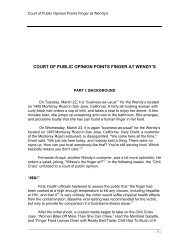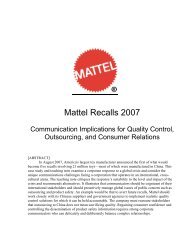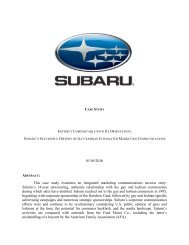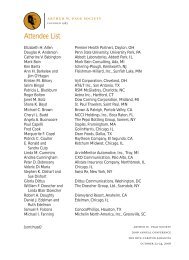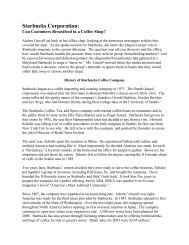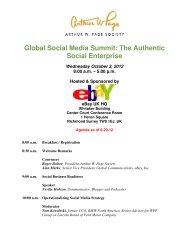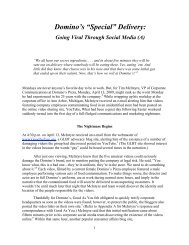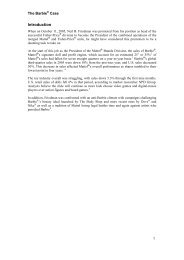The Barbie Case - The Arthur Page Society
The Barbie Case - The Arthur Page Society
The Barbie Case - The Arthur Page Society
Create successful ePaper yourself
Turn your PDF publications into a flip-book with our unique Google optimized e-Paper software.
Massachusetts Financial Services (MFS)<br />
MFS, a Boston-based firm, managed approximately $140<br />
billion as of 2003. “Beginning at least as early as July 2001,<br />
MFS routinely provided certain broker-dealers with its<br />
internal policy allowing market timing in the Unrestricted<br />
Funds, and routinely directed known market timers to the<br />
Unrestricted Funds.” 11<br />
Allegations of Market Timing at Putnam<br />
In November 2003, the SEC and the State of Massachusetts<br />
filed formal complaints alleging market timing at Putnam.<br />
“At least six Putnam employees who worked as<br />
investment management professionals engaged in<br />
excessive short-term trading of Putnam mutual funds<br />
in their personal accounts. Four of those employees<br />
engaged in such trading in funds over which they had<br />
information regarding, among other things, portfolio<br />
holdings, valuations and transactions not readily<br />
available to all fund shareholders.”<br />
<strong>The</strong>se allegations focused on two key portfolio managers–one<br />
who was the head of international equities and the other who<br />
was a chief investment officer on the international team.<br />
Between 1998 and 2003, these portfolio managers executed<br />
numerous individual trades, often worth hundreds of<br />
thousands of dollars. In total, the managers were each<br />
accused of having made more than 30 “round-trip” trades,<br />
many of which involved sales on days immediately following<br />
buys. In all, the six employees (the two portfolio managers<br />
and four of their subordinates) were thought to have<br />
generated more than $1 million in profit from short-term<br />
trading Putnam funds.<br />
<strong>The</strong> SEC and the State of Massachusetts believe that Putnam<br />
learned of this trading activity in early 2000, but failed to take<br />
proper steps to address the misconduct. Most importantly,<br />
sufficient monitoring and control systems were not<br />
implemented to fully prevent employees from market timing<br />
Putnam funds. Evidence presented suggests that the<br />
aforementioned portfolio managers continued to rapidly<br />
move large sums of money in and out of their own funds<br />
through 2003 despite being admonished about the ethicality<br />
of such actions in 2000. <strong>The</strong>se portfolio managers, both of<br />
whom earned in excess of $5million on an annual basis, were<br />
neither reprimanded for their actions nor made to return the<br />
profits they had earned through market timing. Tim Cahill,<br />
the Treasurer of Massachusetts recalls being particularly<br />
arthur w. page society<br />
troubled because the head of international equities had<br />
received a promotion during the time period in question.<br />
This promotion was alarming because it took place after he<br />
was explicitly warned about his market timing activity. 12<br />
In separate charges, the State of Massachusetts also accused<br />
Putnam of allowing certain members of a large 401(k) plan<br />
to engage in excessive short-term trading of Putnam funds.<br />
Ten individuals were thought to have earned more than $1<br />
million in profit by taking advantage of stale mutual fund<br />
prices. After being made aware of this activity, Putnam<br />
allegedly took two-years to install measures that would<br />
prevent these clients from market timing Putnam funds.<br />
<strong>The</strong>se charges arguably put Putnam on par with its industry<br />
peers like Janus and Alliance who had also permitted market<br />
timing. Putnam allegedly tried to stop this type of client<br />
transaction whereas Janus and Alliance allegedly agreed with<br />
clients to market timing arrangements. But, “what<br />
distinguishes this case [Putnam] from other market-timing<br />
cases is that Putnam breached its fiduciary duty, by failing to<br />
disclose potentially self-dealing trading by its own portfolio<br />
managers.” 12<br />
Dealing with an Investigation<br />
Learning of the Problem<br />
On or about September 11, 2003, the SEC made its first<br />
request for documents (i.e., trading records) from Putnam<br />
regarding market timing by its own portfolio managers.<br />
“On September 16, the company’s nine most senior<br />
executives gathered in the late morning in a windowless<br />
eighth-floor conference room…Toward the end of the<br />
meeting, when the subject of money managers’<br />
frequent trading in 2000 came up, Haldeman shoved<br />
his chair back from the table in disgust, according to<br />
several witnesses. ’Maybe I’m just naïve, but I can’t<br />
imagine anyone in the investment management<br />
business would ever do something like this,’ he yelled.<br />
’<strong>The</strong>se people have to be fired.’” 14<br />
“When Putnam dug deeper into the employees’ trading<br />
record, it became clear that as far back as 2000, four<br />
money managers had taken advantage of big moves in<br />
US stock markets to profitably trade in and out of the<br />
very international mutual funds that they supervised.<br />
<strong>The</strong>ir profits came directly at the expense of long-term<br />
investors. Putnam at the time had ordered them to<br />
stop trading.” 15<br />
19



